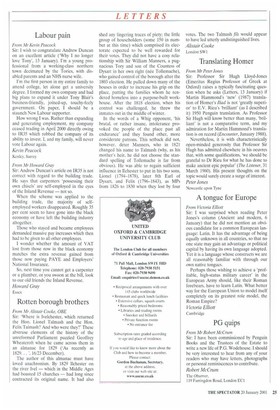Sir: 'Where is Ivelchester, which returned the Hon. Lionel Talmash
and the Hon. Felix Talmash? And who were they?' These abstruse elements of the history of the unreformed Parliament puzzled Geoffrey Wheatcroft when he came across them in an almanac for 1829 (-As recently as 1829... ',16/23 December).
The author of this almanac must have loved anachronism. By 1829 Ilchester on the river Ivel — which in the Middle Ages had boasted 15 churches — had long since contracted its original name. It had also
shed any lingering traces of piety; the little group of householders (some 150 in number at this time) which comprised its electorate expected to be well rewarded for their votes. They did not have a cosy relationship with Sir William Manners, a pugnacious Tory and son of the Countess of Dysart in her own right (née Tollernache), who gained control of the borough after the 1803 election. He pulled down many of the houses in order to increase his grip on the place, putting the families whom he rendered homeless into a purpose-built workhouse. After the 1818 election, when his control was challenged, he threw the inmates out in the middle of winter.
In the words of a Whig opponent, 'his brutal, or rather insane, intolerance provoked the people of the place past all endurance' and they found other, more considerate patrons. This setback did not, however, deter Manners, who in 1821 changed his name to Talmash (why, as his mother's heir, he did not choose the standard spelling of Tollemache is far from obvious). He was able to regain sufficient influence in Ilchester to put in his two sons, Lionel (1794-1878), later 8th Earl of Dysart, and Felix (1796-1843), as MPs from 1826 to 1830 when they lost by four votes. The two Talmash fits would appear to have led utterly undistinguished lives.
Alistair Cooke
London SW1






























































 Previous page
Previous page